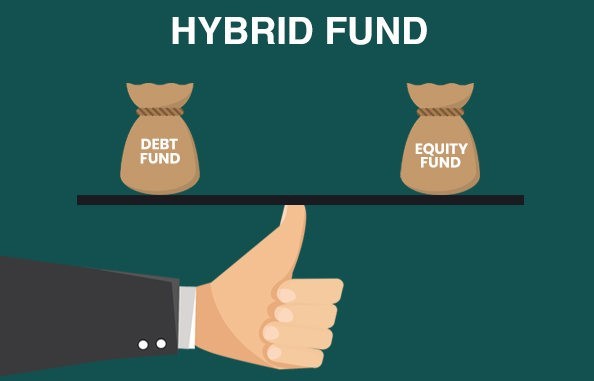Investing can be overwhelming, especially when trying to balance risk and returns. This is where hybrid funds come into play. These funds blend equity and debt instruments to offer a balanced investment approach, making them ideal for investors seeking moderate risk with steady growth. Let’s explore hybrid mutual funds in detail.

What Are Hybrid Funds?
Hybrid funds are investment vehicles that allocate assets across multiple asset classes, primarily equities (stocks) and debt (bonds). The aim is to provide investors with a diversified portfolio that can deliver both capital appreciation and stability.
Types of Hybrid Funds
Hybrid mutual funds come in different forms, catering to various risk appetites and financial goals. Here are the main types:
1. Aggressive Hybrid Funds:
- Invest 65-80% in equities and the rest in debt.
- Suitable for investors with a higher risk tolerance.
2.Balanced Hybrid Funds
- Maintain an equal allocation between equity and debt (40-60% each).
- Provide a balance of growth and stability.
3. Conservative Hybrid Funds
- Allocate 75-90% to debt and the rest to equities.
- Ideal for risk-averse investors seeking steady returns.
4. Dynamic Asset Allocation Funds
- Adjust the equity-debt ratio dynamically based on market conditions.
- Suitable for investors who want professional management of their asset allocation.
5. Multi-Asset Allocation Funds
- Invest in at least three asset classes (e.g., equity, debt, gold, real estate, etc.).
- Diversifies risk further by spreading investments across multiple assets.
6. Arbitrage Funds
- Utilize arbitrage opportunities in the market to generate low-risk returns.
- Suitable for conservative investors who prefer stability over aggressive growth.
7. Equity Savings
- Equity Savings Funds are a type of hybrid mutual fund that invests in a mix of equity, debt, and arbitrage opportunities.
- These funds aim to provide investors with moderate returns while keeping risk levels lower than pure equity funds.
Why Invest in Hybrid Funds?
Hybrid mutual funds offer a unique mix of benefits that appeal to a wide range of investors:
1. Diversification
By investing in multiple asset classes, hybrid mutual funds reduce the risk associated with market fluctuations.
2. Balanced Risk-Return
They provide equity exposure for capital growth and debt instruments for stability.
3. Automatic Rebalancing
Some hybrid mutual funds dynamically adjust asset allocation based on market conditions.
4. Professional Management
Fund managers actively rebalance the portfolio to optimize returns.
5. Ideal for Moderate Risk Investors
Suitable for those who want exposure to equities but with lower volatility.
6. Ideal for First-Time Investors
Hybrid mutual funds are a great starting point for beginners looking to enter the stock market with reduced risk.
7. Tax Efficiency
Certain hybrid mutual funds (especially those with over 65% equity allocation) enjoy tax benefits similar to equity funds.
Equity-oriented hybrid mutual funds: Gains exceeding Rs 1 lakh per year are taxed at a rate of 10%. On the other hand, the Short-Term Capital Gain (STCG) tax is levied at a rate of 15% on profits made on investments held for less than one year.
How to Choose the Right Hybrid Fund?
Before investing in a hybrid fund, consider the following:
- Your Risk Appetite – Choose between aggressive, balanced, or conservative funds based on your comfort level with risk.
- Investment Horizon – Longer investment periods generally allow for better returns.
- Fund Performance – Check the historical performance and consistency of returns.
- Expense Ratio – A lower expense ratio can maximize your returns over time.
- Fund Manager’s Expertise – Look for funds managed by experienced professionals.
Conclusion
Hybrid funds offer the perfect mix of growth and stability, making them a great choice for investors with varying risk preferences. Whether you’re a beginner or an experienced investor, these funds can help you achieve your financial goals while minimizing volatility.
Are you ready to start investing in hybrid mutual funds? Do your research, choose wisely, and enjoy a balanced investment journey! 🚀
References:
Know more about Index Funds
SEBI Guide for Hybrid Mutual Funds
Table of Contents
Latest Posts
- Active Funds vs Passive Funds – Differences, Performance, Risk, and Costs Compared
- Pension Plans In India: Types, Benefits & Which One To Choose
- Equity Funds vs Mutual Funds: Understanding the Differences and Choosing the Right Investment
- Hybrid Funds – Balancing Risk and Reward In Your Portfolio
- Debt Funds: Types, Benefits & Returns